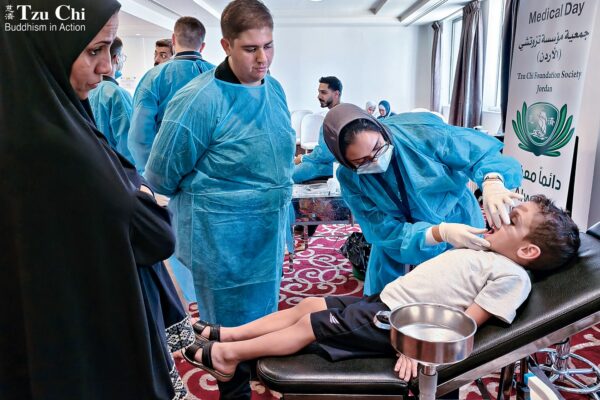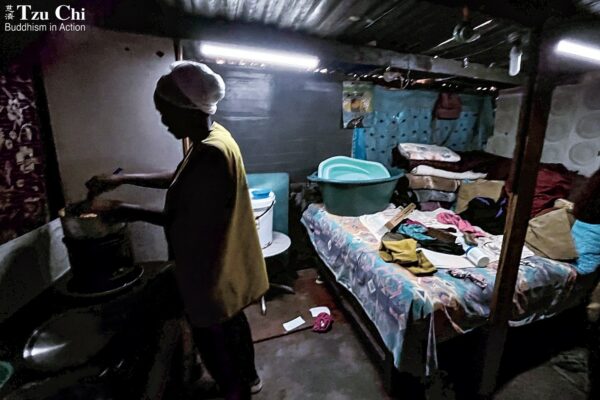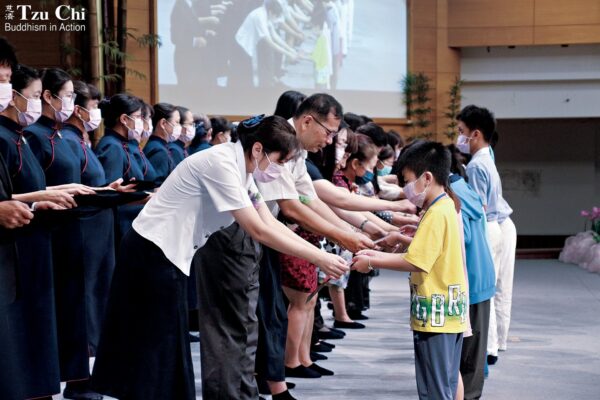By Tse Kan
Compiled and translated by Wu Hsiao-ting
As COVID cases in Hong Kong hit record numbers, volunteers in the city visited one institution after another to deliver anti-coronavirus supplies. The atmosphere was tense, but everyone working together to help the city brought light to a dark time.
After enduring four waves of COVID-19, Hong Kong enjoyed a happy respite from the infection in 2021—several months passed in the second half of the year during which no domestic cases were reported in the city. In response, the government eased its precautionary measures to curb the virus. We Tzu Chi volunteers in Hong Kong looked forward to finally being able to hold our annual blessing ceremonies after a two-year suspension. Eight such ceremonies, albeit on a smaller scale, were scheduled to take place in January this year.
However, sometimes the best laid plans change, which is all the more true during the pandemic. The fifth COVID wave hit so suddenly and took off so rapidly that the government tightened its pandemic restrictions again. After stricter COVID countermeasures were announced on January 5, our Hong Kong chapter cancelled its scheduled blessing ceremonies.
Nearly two years had passed since I had visited my aging parents in my childhood home in Fujian Province, southeastern China. As the coronavirus situation in Hong Kong continued to escalate, my parents were very worried about me. Even when they took sick, they forbade my sisters to tell me about it. They always told me they were doing very well and not to worry about them. Instead, they encouraged me to focus on myself and my children and take good care of ourselves. They said there was no urgency to visit them, that a reunion with them could wait until the pandemic was over and quarantine was no longer mandatory.
It was a long and gloomy winter. Daily case counts shot up from the hundreds to thousands to tens of thousands in two short months. As the numbers climbed, more and more people around me became infected. In the beginning, we could receive our screening results on the very day we were tested, but then the wait extended to two to three days or even a week. The load on the healthcare system was very heavy. With high numbers of people needing to be tested, every test center and mobile sample collection station was swamped. Face masks became a daily necessity and the demand for COVID test kits soared.
Though the Tzu Chi Jing Si Hall in the city was forced to temporarily close, Tzu Chi Hong Kong’s charitable work never stopped. In fact, our volunteers stepped up their efforts to solicit donations and tried all sorts of channels to purchase PPE and other necessities to help in the fight against the spread of the infection.
On February 24, 50,000 COVID-19 antigen test kits arrived in Hong Kong. They had been purchased for us by Tzu Chi volunteers in Guangdong Province, southern China. Another 4,000 donated test kits of a brand appointed by the government arrived at the Jing Si Hall at the same time. Tzu Chi headquarters in Taiwan sent us a shipping container packed with 90,000 rapid test kits and 746 boxes of Jing Si herbal tea in concentrated liquid, tea bag, and drop forms. (Jing Si herbal tea was a health drink developed in response to the coronavirus pandemic and contains an effective mixture of herbal medicines). Fifty thousand face masks purchased by Tzu Chi Hong Kong from South Korea reached us on March 2. Forty thousand COVID-19 antigen test kits, another donated batch, arrived soon after.
When I learned about all this from volunteer Lin Hui Hung (林惠鴻), I was deeply moved. So many kind-hearted people and volunteers had been quietly working to help our city battle the latest wave of infections, and yet I had done nothing to help. That’s when I expressed my willingness to Sister Lin to serve as a documenting volunteer during this period to help record Tzu Chi Hong Kong’s anti-coronavirus efforts.
I live with my oldest daughter. She is a piano teacher and has contact with many students. I work too. Neither of us can achieve zero contact with other people anyway, so I had no qualms about going out to record Tzu Chi’s work.
During this time, our volunteers had been contacting our long-term care recipients, other underserved people, and institutions to inquire about their situation and about whether they had enough anti-coronavirus supplies to meet their needs. Based on the information they collected, supplies were quickly packed and delivered to individuals and organizations, with the number of helpers kept to a minimum.
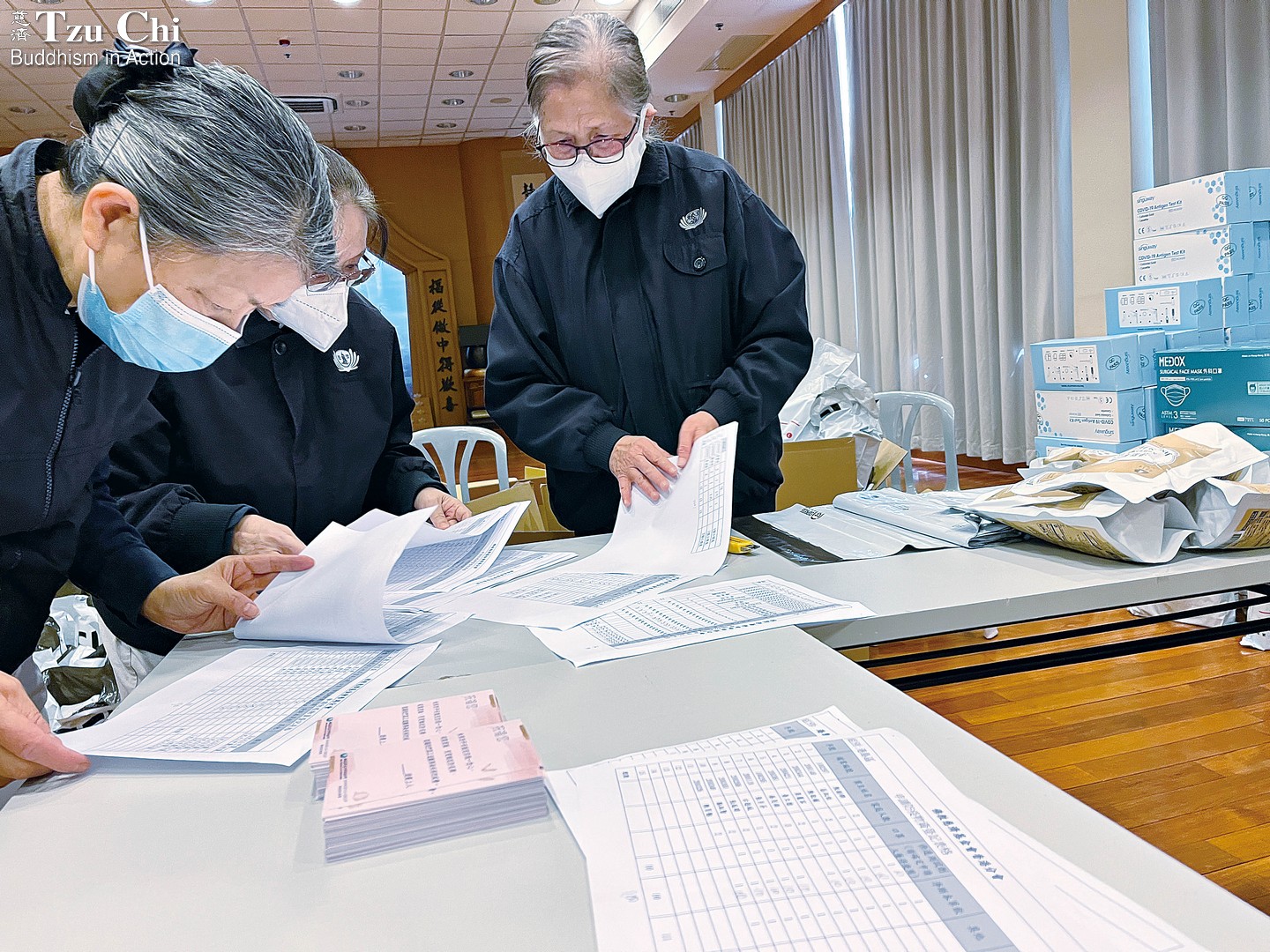
Volunteers check lists of underserved families needing anti-coronavirus supplies before packing goods for delivery. Volunteers had compiled the lists after personally contacting one disadvantaged household after another to ascertain their needs. Hsu Su Chin
Love as the antidote
Hong Kong reported over 50,000 cases daily at the peak of its fifth wave. Everyone was very worried. However, even when things were at their worst, there was no lack of volunteers to help carry out Tzu Chi work. Sze Chung Ling (施頌鈴), CEO of Tzu Chi Hong Kong, pointed out that despite the severity of the COVID situation, the response was always enthusiastic any time the chapter asked for volunteers. For example, volunteers Leung Yun Hung (梁潤雄) and Ho Chun Yau (何俊佑) each has two little grandchildren at home, and their families didn’t want them to go out to volunteer—they were afraid that they might bring the virus home. Even so, the two volunteers bravely stepped up to the plate.
Making deliveries during such a time was risky, especially for these older volunteers, but they accepted the challenge without complaint or regret.
Accompanying our volunteers to document their efforts, I saw firsthand what a challenge the pandemic had posed to our society and how everyone was doing their part to help pull our city through this difficult time.
Many institutions, such as nursing homes for the elderly or facilities for people with disabilities, had reported confirmed cases. Most of those infected had to quarantine on-site, in their own rooms. However, because so many employees at such institutions had also been infected, there was a severe shortage of manpower, making the workload of those who could still remain on duty very heavy.
The volunteers and I could feel the worry and concern about the pandemic and the people under their care from the frontline workers, whether they were institutional administrators, nurses, social workers, or regular employees. But behind that worry and concern was something else: an unselfish Great Love. It was deeply moving to witness. These frontline workers, even after seeing their colleagues fall victim to the virus one after another, still stuck to their post. They were all greatly worthy of our respect.
During this difficult time, to be able to provide some help to these people, to be able to spread the love of Dharma Master Cheng Yen and Tzu Chi volunteers through them, made us feel that every little effort we made, every small bit of love we gave, was worth it.
Every institution we reached out to had needs for different supplies. But whether it was rapid test kits, face masks, protective clothing, gloves, or hand sanitizer that they needed, we did our best to supply. Shipping services were also impacted by the fifth COVID wave, since many cross-border truck drivers were also infected. As a result, a lot of goods couldn’t get into Hong Kong, and the prices of vegetables and other kinds of food spiked. Getting by became even more difficult for vulnerable people. Therefore, our volunteers followed the distribution of anti-coronavirus supplies with that of food and shopping vouchers to help needy families cope.
The world is rife with suffering, and we pray for the pandemic to be over soon. However, we have an antidote to any kind of suffering, as long as there is love and kindness. Love never ceases to be the miracle cure of life.
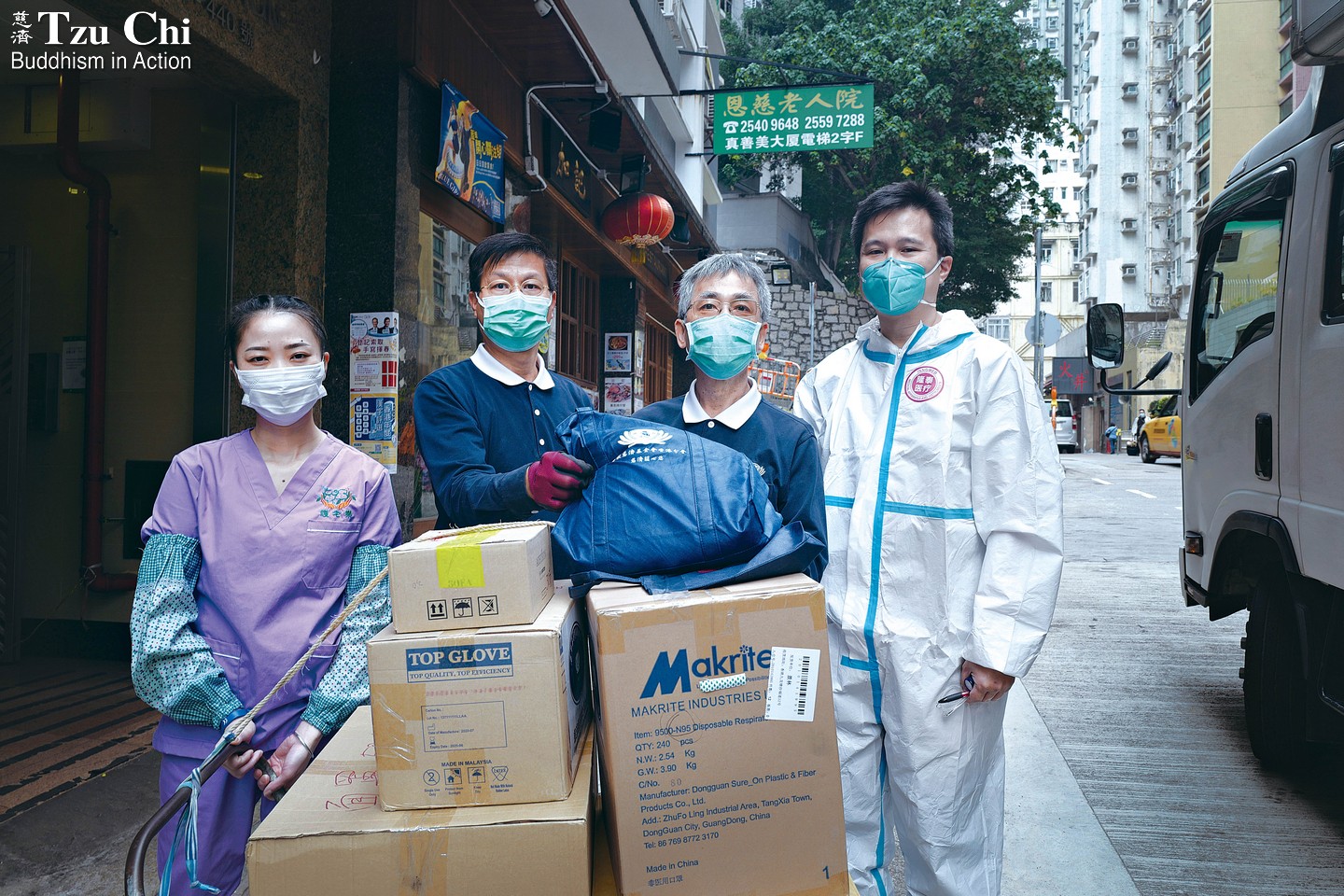
Volunteers pose with staffers of a nursing home in front of the facility after delivering anti-coronavirus supplies to the institution. Tse Kan

